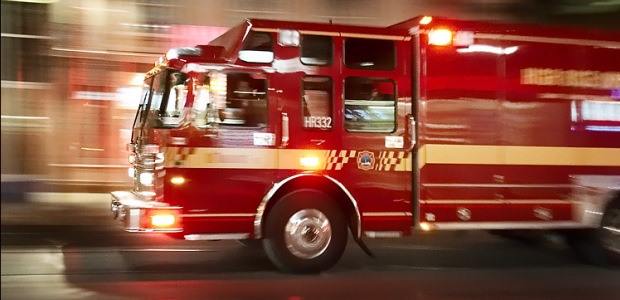
Ramp-Up Alert Tones Lower Firefighters' Stress, Study Finds
The researchers found that standard alerting caused a median increase in heart rate of 7 beats per minute, while the ramp-up tones caused a median increase of 5 bpm. Their post-study survey found the firefighters strongly preferred the ramp-up tones.
Researchers concluded in an article published in the Journal of Occupational and Environmental Hygiene (JOEH) that fire departments can reduce stress on firefighters by signaling emergencies with "ramp-up" alert tones -- alarms that gradually rise in intensity instead of sudden, full-volume alerts.
In their article, "Effect of Station-specific Alerting and Ramp-up Tones on Firefighters’ Alarm Time Heart Rates," James J. MacNeal and Christopher L. Wistrom of the Department of Emergency Medicine, Mercyhealth (Janesville, Wis.) and David C. Cone of the Yale University School of Medicine's Department of Emergency Medicine noted that of the 97 firefighters who died in the line of duty during 2013, 32 died from overexertion, stress, and related medical issues, and that heart attacks accounted for two-fifths of on-duty deaths in the past five years.
Previous studies have established that firefighters are more susceptible to heart attacks when responding to emergencies versus non-emergencies.
The study involved 42 firefighters at an urban, three-station fire department. The researchers analyzed participants' heart-rate increases in response to standard alerting and to alerts that gradually "ramp up" the audio volume. They found that standard alerting caused a median increase in heart rate of 7 beats per minute, while the ramp-up tones caused a median increase of 5 bpm, and their post-study survey found the firefighters strongly preferred the ramp-up tones.
"Ramp-up tones were also perceived as the best alerting method to reduce stress during both the day and overnight," the authors wrote. "This study suggests that the manner in which firefighters are alerted does have an influence on their physiologic response to the alarm."
The 35th Annual National Fallen Firefighters Memorial Weekend is being marked Oct. 8-9 to honor firefighters who died in the line of duty during the previous year.
The study's authors thanked the City of Beloit (WI) Fire Department and Beloit Firefighters Local 583 for their assistance in the research and also the Best Buy in Janesville, Wis., for giving the investigators a 20 percent discount on the purchase of the heart rate monitors.
JOEH is published jointly by the American Industrial Hygiene Association and the American Conference of Governmental Industrial Hygienists.